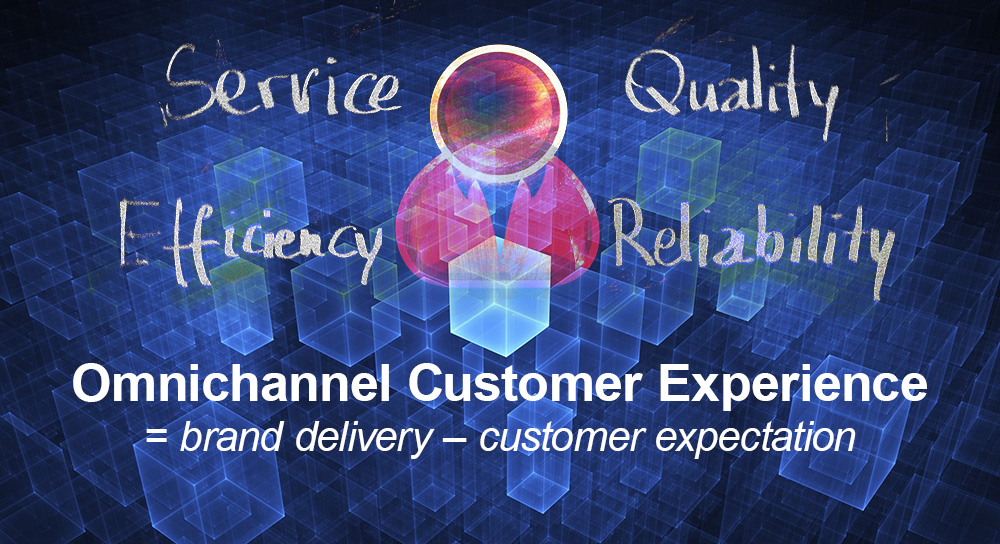Democratizing AI is Crucial to Harmonising Omnichannel Customer Experience
As more and more products get commoditized, customer experience (CX) will be the new battleground as brands attempt to differentiate themselves. But what is CX, how do we measure it, and how can we optimize it? In essence, CX consists of two components and can be described by the equation:
CX = brand delivery − customer expectation
Although brands strive to optimize the delivery of their product and services, customer expectation is a moving target that is much harder to quantify and measure. When selling was done in-person, this was not an issue, because humans are extremely good at gauging customers’ expectations and accommodating to all the different customer needs.
The Digital Reality and Opportunity
In the wake of the post-pandemic era, digital commerce is now the new normal. All businesses are shifting online devoid of human touch. This digital shift is not only a response to contain the pandemic, but rather a strategic move to operate one’s business more efficiently. It’s only a matter of time before all businesses become online businesses. But once online, differentiating with CX becomes a huge challenge, because there isn’t a human sales rep to engage with customers and attend to their ever-changing needs.
This is where artificial intelligence (AI) comes in. Although digital interactions create friction for deep customer engagement, they are perfect for collecting massive amounts of data throughout digital channels. This data can be used to train an AI to mimic human decisions in different contexts. Personalisation and Business AI will become crucial as a majority of businesses are operating with a digital-first mindset.
The Importance of AI for CX
As businesses embrace this digital shift, they face a new challenge of how to assimilate that huge volume of data to understand the customer on the other side of the digital channel. The problem has always been, how can we assess the expectation of an invisible customer, so we can deliver the right product, at the right price, at the right time, through the right channel, under the right context, so the customer has a consistently good CX.
Although brands should strive to deliver more than the customer’s expectation, always delighting the customer is not sustainable because customers will constantly raise their expectations. Yet, customers don’t expect to be delighted all the time. But they do expect a consistent CX that is harmonized across all digital touchpoints. However, the customer expectation component of the CX equation is fluid and ever-changing. To keep up with such a dynamic variable across digital channels, companies need to develop a new kind of corporate competency—the AI competency.
A New Corporate Competency in AI
Today AI is merely a tool, but in the near future, AI will become a new corporate competency that is crucial to the delivery of a consistent CX through every customer touchpoint. This core competency is the ability to get real-time data from the market and execute real-time decisions. Adopting and using Business AI throughout the enterprise to automate business decisions will help companies develop this corporate competency. This is critically important to delivering a consistent CX because customer expectation is ephemeral. Every intent signal, transaction data, customer interaction insight, real-time materials cost, market volatility, inflationary pressure, and even competitive moves can potentially change a customer’s expectation. Without AI it’s virtually impossible to keep up with the dynamics of customer expectations.
While this new AI competency will be important for every business, it’s often cost-restrictive to develop in-house. The teams, systems, and infrastructure required to test, manage, secure, and maintain proprietary AI systems can oftentimes turn the deployment of AI into a full-blown R&D operation. Not to mention the fact that AI systems often rely on singular points of failure or individuals that may move on to new assignments. This makes the development, deployment, and maintenance of an in-house AI solution impractical, even for companies that have already started on the AI adoption journey and have secured their own data science talent.
The Democratization of AI and Its Implication on CX
What these companies need now is a tool that enables the democratization of AI. Today, many businesses have algorithms and data, but not the capacity to turn them into scalable business solutions that are deployable to the cloud and accessible everywhere. An Extensible AI would allow businesses to plug in their algorithm, or use their own data to augment existing Business AI solutions.
Business AI that is extensible provides organizations a means to use their data in real-time through their proprietary algorithms with plug-and-play ease. Through the learning and feedback loop in AI, they will be able to execute better decisions faster as a company rather than just inside a tool in a point solution. This enables organizations to operate more like an AI so they can adapt faster and better to the increasingly volatile business environment.
Proprietary Business AI will become more accessible to traditional enterprises, effectively democratizing AI through this extensibility. Ultimately, companies will compete more effectively, especially in areas where real-time decision and performance constancy are required under extremely dynamic business environments, such as CX.
Conclusion
The delivery of a consistent CX is challenging enough due to the volatile customer expectation part of the CX equation. Yet, to address this challenge, organizations are met with an even greater challenge of developing a corporate competency in AI. However, Business AI doesn’t have to be inaccessible. The concept of Extensible AI can amplify the initial investments in data science, lower the total cost of ownership, and democratize proprietary Business AI for all.
B2B businesses that want to truly thrive in today’s constantly changing environment must continue to adapt and adopt the new realities of digital. Business AI will be a critical component required to drive online customer engagement with consistent CX. Successful adoption of AI will not only help brands differentiate, but it will mark how enterprises can truly outperform and sustain a competitive advantage.
DISCLAIMER: The content of this article was first published by TechNative. Here is the latest revision and a current rendition of the raw manuscript submitted to the publisher. It differs slightly from the originally published version.



